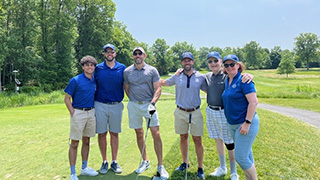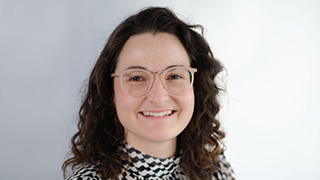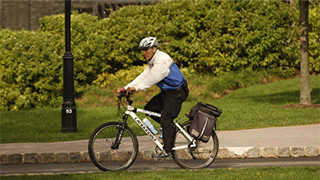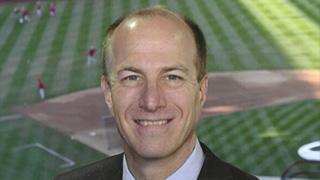Re-imagining Conflict Mediation and the Role of Religion
Tuesday, February 25, 2020
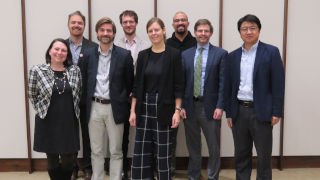
Pictured from left to right: Associate Dean Elizabeth Halpin, Professor of Practice David Wood; CARIM Program Officers: Owen Frazer, Dr. Emanuel Schäublin, and Cora Alder; Research Assistant Houssam Eddine Beggas, Acting Dean Courtney Smith, and Professor Zheng Wang.
This winter, Seton Hall's Center for Peace and Conflict Studies hosted a delegation of officers from Zurich's Center for Security Studies, who challenged the Seton Hall community to reimagine conflict resolution approaches. Representing the Program on Cultural and Religion in Mediation (CARIM), Cora Alder, Owen Frazer, and Dr. Emanuel Schäublin lead an interactive discussion with over sixty students on how conflicts with religious dimensions pose particular challenges for mediation.
The CARIM Program understands religion as a worldview that shapes how a community behaves during conflicts. Based on this understanding, student discussion participants brainstormed real-world examples of behaviors and current events that inhibit the conflict mediation process. These examples fell into distinct categories including: a lack of understanding and unfamiliarity between groups, highly sensitive "sacralized issues" that groups are unwilling to discuss, and existential fears associated with other groups.
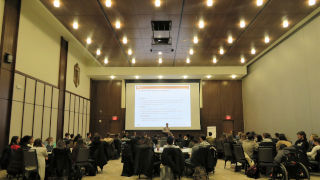
Cora Alder, Owen Frazer, and Dr. Emanuel Schäublin lead an interactive discussion with over sixty students in attendance.
To help navigate these types of challenges, the visiting delegation stressed the importance of an approach to mediation that creates a safe place for all sides of conflicts and the worldviews they represent. As the CARIM scholars noted, feedback gained from their peacebuilder and mediator trainings has affirmed the effectiveness of this approach to mediation. CARIM has been and continues to apply this "safe space" practice to a range of protracted conflicts, including between different Buddhist groups in Sri Lanka and between Salafist actors and secular democratic groups in Post-Arab Spring Egypt.
Since its creation in 2014, the Seton Hall Center for Peace and Conflict Studies has been exploring the impact of worldview conflicts on mediation and peace processes and the role that religious actors can play in mediation. Building on their recent program with the Center for Security Studies and the CARIM program, the two centers are currently exploring opportunities for further collaboration, including research and joint workshops, with the goal of improving the capacity of peace practitioners to transform conflicts with worldview dimensions.
Learn more about the work of Seton Hall's Center for Peace and Conflict Studies »
Categories: Campus Life, Faith and Service


